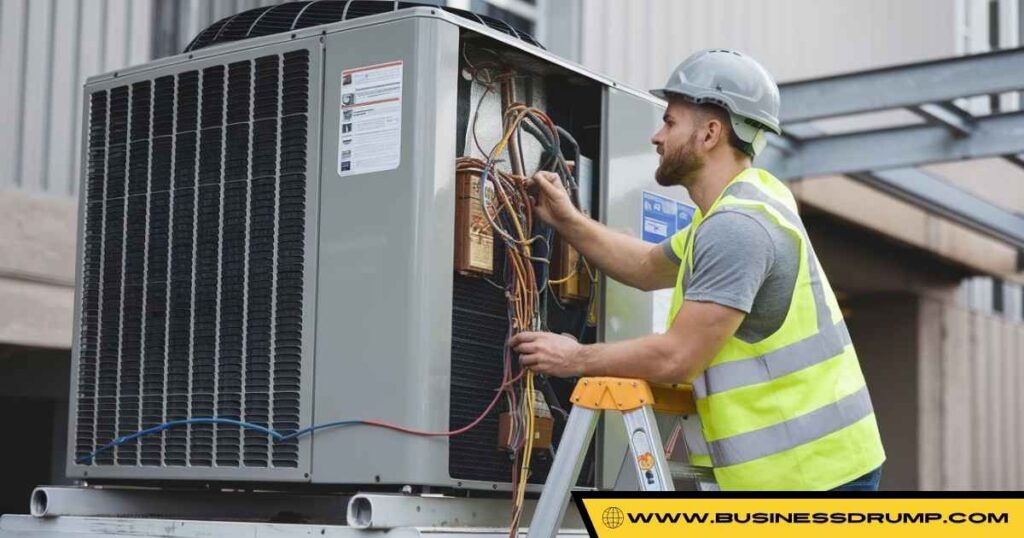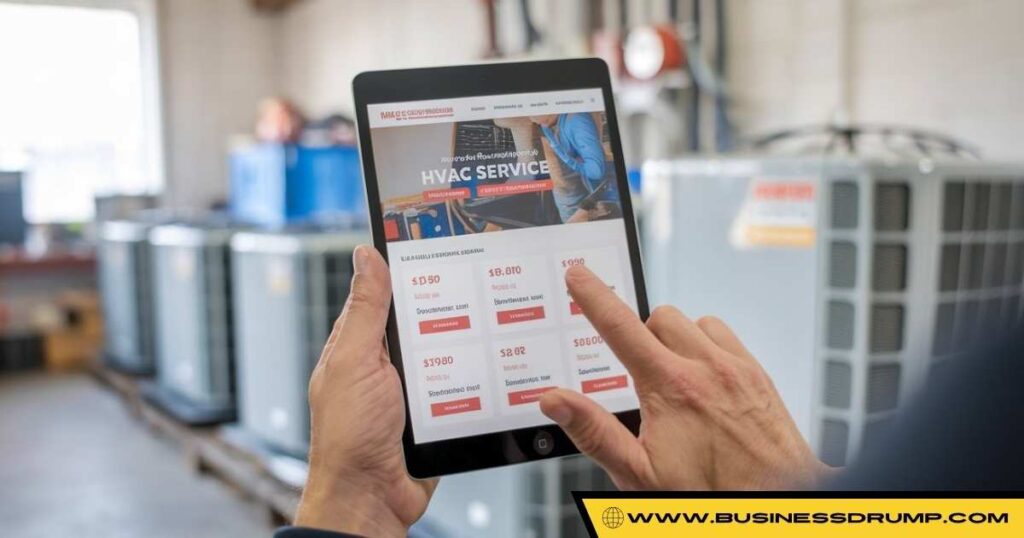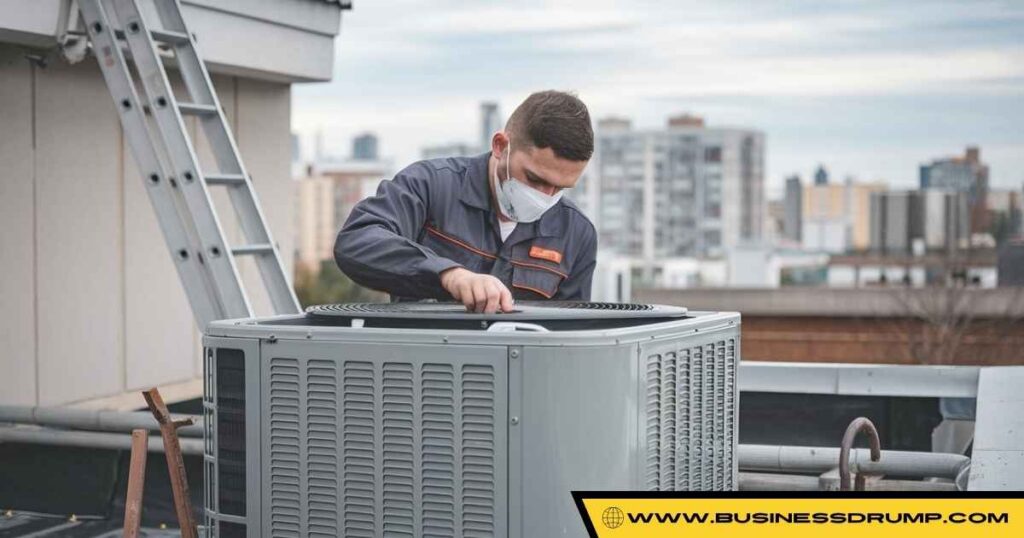The HVAC business is a venture that can yield high revenues after the increasing need of heating, ventilation, and air conditioning business. Every technician whether a beginner or experienced should follow the proper steps to be successful in this highly competitive market.
Are you prepared to start from your talents and create a fantastic business? Following the next 12 steps will make it easier for you to lay down the foundation of the HVAC company and launch it.
1. Get your HVAC certification and license
Everybody planning to begin an HVAC business must first have the right certification and license.
Take an HVAC certification program
Become an HVAC certified professional by enrolling in a certified HVAC program that teaches basic skills such as installing, repairing and maintaining heating and cooling systems. Most programs also include the safety procedures and the environmental standards that are essential when dealing with refrigerants.
Become a licensed HVAC contractor
Upon completion of the necessary steps above, go for your HVAC contractor license depending on your state. About thirty-one out of fifty states of the U. S. expect candidates to pass several exams in addition to experience and continuing education to be licensed. A valid license guarantees you can legally engage in doing business on the construction of houses, or business ventures.
Explore our HVAC company resources.
Some suggestions are to refer to the information available on various associations for HVAC, the government or business management and industrial blogs for new trends, practices and management ideas. These resources can also assist you in dealing with legal issues as well as its compliance and other services relevant to your developing HVAC business.
2. Create your HVAC services list
In this business, you require a clean list of services to provide your clients for you to thrive in the HVAC business competition. This makes it possible to focus on specific customer requirements which may be offered to them, at the same time being unique from other similar products or services.

A well-defined services list also assists you to be able to effectively selling your services and determining the most suitable price for the services that you offer. Here’s how you can create your HVAC services list: Here’s how you can create your HVAC services list:
- Residential HVAC Installation: Provide home heating, cooling, and ventilation services which entail offering of furnaces, air conditioners, and heat pumps among others.
- Commercial HVAC Services: Offer services in installing new air conditioning systems, air conditioning repair as well as maintenance of air conditioning systems for commercial buildings including offices, stores, and warehouses.
- HVAC Maintenance and Repair: THERE ARE Sewer and pump system cleaning, Chiller and boiler service, Filter changes, inspections, and repair of air conditioning and heating systems to avoid future complications and higher costs.
- Indoor Air Quality Solutions: Air duct cleaning, humidifier installation, air purification; residential and commercial premises as well as evaluating and mitigating indoor air quality issues.
- Emergency HVAC Services: Provide emergency repair services for various complications involving the heating systems and ac which in turn helps you get more customers.
Tailoring your services to meet local demands will ensure consistent business growth.
3. Create an HVAC business plan
The management of an HVAC business requires a stable plan for any business to have a good start. Essentially, it is a development plan, a strategic vision identifying what you want to achieve, how you are going to do it, and the likely costs involved. However, to identify objectives that are clear and also maintain focus on them, you need to have a clear plan which, in turn, can attract investors or lenders may support a business.
Here’s what to include in your HVAC business plan:
- Executive Summary: It introduces your HVAC business and provides a brief description of your business’s vision and mission and the main goals of the company.
- Market Research: Assess your specific market, competition and need for HVAC services in the regions of operation. The analysis should also incorporate information regarding the Industry trends and the needs of the customers.
- Services Offered: Describe in detail the HVAC services that you are going to offer in terms of installations/repairs/maintenance and IAQ.
- Marketing Strategy: Enumerate the ways how you will be able to reach out to your target market through digital marketing techniques, local advertisements, and referrals.
- Financial Projections: There should be detailed financial projections estimating the costs of launching the business, expected earnings for a given period, and the time horizon within which the business is likely to start generating profit.
- Operational Plan: Describe day-to-day business such as human resources in terms of staffing and recruitment, use of machinery and equipment, and business relations with suppliers and affiliates.
A well-structured plan will guide your business to success and growth.
4. Get funding for your HVAC business

The right funding is very important in catering for some of the expenses that are incurred during the initial stages and for your HVAC business to have the capital that it needs. No matter, if it involves buying some equipment, advertising, or recruiting staff, working with a financial plan, is critical.
Here are some common ways to fund your HVAC business:
- Personal Savings: Most start with their savings: Any business person needs to have some capital base to begin the business and it is usually obtained through their savings. This is no risk is involved but you may restrict your starting capital to some extent.
- Small Business Loans: One should consider getting a loan through banks, and credit unions as well as through the Small Business Administration (SBA). SBA loans are usually preferred due to the lower interest rates as well as the flexibility of the loan.
- Investors: If you have good business plans, you can be able to attract investors most of who will be willing to invest in your business with the promise of a share in the profits.
- Business Credit Cards: These can be done for minor expenses like the purchase of tools, equipment or even promotional items. Nevertheless, keep your eye on one important factor dangerous at times, namely, the interest rates.
- Crowdfunding: One can use the crowdsourcing mechanism by going to Kickstarter GoFundMe, and other similar sites to get funds from supporters. This can work if you are willing, for instance, to flood the airwaves with advertisements that will make people look forward to getting a new HVAC.
When financed properly you with be in a good place to start your HVAC business and expand it effectively.
|READ MORE POST : A Comprehensive Analysis of 72Sold Reviews Houzeo |
5. Register and license your HVAC business
Registration and licensing are very important since they assist in the LEGAL and professional running of the business. It also helps to guarantee that you align your business with the set state and local authorities laws and avoid repercussions like fines and litigation.
Choose and register your business name
Choose a name that is quite easy to remember with emphasis on the fact that you deal with HVAC services. Make sure it is not already being used by checking from your state’s business registry. To proceed with choosing, and it should be an unusual name, you should at first register it as a ‘Doing Business As’ or DBA if you are not using your name. How to Start HVAC Business.
Apply for a small business license
Of course, every state and every locality has its specific requirements for HVAC businesses. Obtain a business license that is appropriate for any type of commercial activity within the city or county where you will be operating your business. You also might require an HVAC-specific contractor license that, in most states, comes with a certification as well as experience.
6. Invest in HVAC business insurance

Liability coverage is a crucial element of risk management for any HVAC contractor so that they can be protected in the event of an accident or incident. The risk of no insurance means that you could lose much in terms of property, personal injury, or litigations relating to your business.
One important insurance policy that should be considered is general liability insurance which will cater for property damage or bodily injury claims, workers ‘ as they will cater for the medical expenses and wages lost if any employee were to get injured, and lastly, commercial automobile insurance in case the business has any company vehicles. Furthermore, one can also not overlook the professional malpractice insurance that will cover a mistake that one is likely to make while practicing.
Proper and complete business insurance keeps the business safe and sound from such mishaps thereby making the business and its owners free to work towards their objective of growing the business, expanding the customer base, and ensuring customer satisfaction. How to Start HVAC Business.
7. Buy HVAC tools and equipment
Ensuring your HVAC business is well equipped is very crucial in delivering ideal services in HVAC. From the process of installing it to the times of repairing it, it helps to do all the work efficiently and gives a professional look.
Key tools and equipment include:
- Refrigerant Gauges: It is for on-check and regulation of system pressures.
- Vacuum Pumps: To be used in evacuating air conditioner systems before charging.
- Multimeters: Crucial in diagnosing electrical problems in projects and other electrical related commodities.
- HVAC Software: It is used for managing time and dates, billing, and client’s information.
Purchasing durable equipment and instruments is relevant to enhancing the quality of services that will in turn meet customers’ expectations.
8. Price your HVAC services

Determining the right prices to charge for the HVAC services is a crucial factor for any business since it determines the company’s profitability and competitiveness. First, identify a geographical market rate and the cost of the labour, materials, and other over head fees.
Other things to be taken into account may include; how labor intensive the job is likely to be, how long it is expected to time and other expenses for example getting permit or disposing off waste. Having honest and an easily understandable pricing policy fosters trustful relationships with the clients. You might prefer flat rates for the frequent services, or you might use hourly rates for complicated projects.
Further, it is necessary to consider the price constant by giving it an evaluation of the changes in costs or the market. For this reason, choosing your prices to be competitive, accompanied with superior services, helps you secure the consumer market while also being able to make a good profit margin. How to Start HVAC Business.
9. Promote Your HVAC Business
Promotion is critical to ensure that you have the opportunity to expand your HVAC business and be able to get customers. First of all, establish an informational, reliable, and user-friendly website that will introduce the company, services, staff members, and clients’ feedback.
Optimize your search engine results through search engine optimization. Manage active accounts on social media networks to comment on the lives of local people and post useful information. Further, one can go for online advertising like Google AdWords or Facebook advertisements for population targeting.
Awareness can also be created through flyers and business cards and through sponsoring local events in your field. Having a well-recognized website, and interacting with the potential customers both virtually and physically will enable the HVAC business to be recognized as the most preferred one. How to Start HVAC Business.
10. Hire HVAC technicians
Certainly! Here’s a table summarizing key points for “Hire HVAC Technicians”:
| Aspect | Details |
| Job Requirements | Look for candidates with relevant certifications (e.g., EPA), experience in HVAC systems, and strong troubleshooting skills. |
| Recruitment Sources | Use job boards, HVAC trade schools, and industry-specific websites to find qualified candidates. |
| Interview Process | Conduct interviews to assess technical knowledge, problem-solving abilities, and customer service skills. Consider practical tests to evaluate hands-on skills. |
| Training and Development | Provide ongoing training to keep technicians updated on the latest technologies and industry standards. Offer certification programs and professional development opportunities. |
| Compensation and Benefits | Offer competitive salaries based on experience and skill level. Include benefits like health insurance, retirement plans, and paid time off to attract top talent. |
| Hiring Timeline | Plan for a thorough hiring process, including background checks and reference verification, to ensure you find the right fit for your team. |
| Work Environment | Create a supportive and safe work environment to improve job satisfaction and retention rates. Ensure technicians have access to necessary tools and resources. |
This table provides a comprehensive overview of the hiring process for HVAC technicians, from job requirements to creating a positive work environment.
11. Build a Customer Base and Reputation

Most HVAC businesses fail in the early stages or fail to achieve their long-term goals and objectives due to their inability to establish good relationship with their customers and the market.
First step is to ensure that every client receives excellent service which will attract more customers owing to the positive word of mouth. Additional factors that can improve the reputation include the follow-ups and requesting the customers’ feedback.
Here are some strategies to build your customer base and reputation:
- Offer Quality Service: Make sure each task that is performed is done meticulously to retain customers’ confidence to do business again.
- Request Reviews: Make sure that dissatisfied customers return to the place of business but deter them from sharing their experiences on social media platforms and other apposite forums.
- Provide Excellent Customer Support: Le: Ensure that you attend to customer queries and sorrows or complaints promptly to ensure that they are loyal to your products.
- Implement Referral Programs: Using the referral method, offer customers an option whereby for every new client that they refer to your business, they are given a certain percentage discount on their products.
- Engage Locally: Also, it augments your visibility and credibility through sponsoring community events and organizations.
12. Stay Compliant with HVAC Laws and Regulations
It is very important to continue to always comply with the legal requirements dealing with HVAC so that one can run the business legally without facing severe consequences and possible fines. This comprises safety, environmental, and licensing regulations and codes recognized at local, state, and federal levels.
Always check the updates in building codes and industry regulations to reflect your practices in line with the change. Also, ensure the permits, inspections, and certifications are kept well tabulated to support any audit or inspection carried out.
If you read and learn everything from it and act accordingly, you are safeguarding your business from any legal hazards and expressing your regard for the clients through your adherence to the standards of the industry. How to Start HVAC Business.
Common Mistakes to Avoid When Starting an HVAC Business

Some of the things a person needs to know when beginning an HVAC business are the mistakes that are likely to be made that can slow him or her down. This should not be the case since these are mistakes that can easily be prevented provided one takes his time to plan and research.
Here are some of the most frequent mistakes:
- Lack of Proper Licensing: Lack of certification or license may lead to legal Trouble and fines.
- Inadequate Insurance: Lack of insurance is not safe for your business and can put you at the receiving end from any accidents or compensations claims.
- Poor Financial Management: One is not tracking the expenses or under-budgeting is one of the key risks as it causes issues with cash flow.
- Underpricing Services: While low price can unlock consumer demand it may contradictingly be mildly detrimental to the company’s profit margin.
- Ignoring Marketing: Word of mouth is a powerful tool, but relying only on them is not healthy for the organization as it has some shortcomings that will restrict the expansion in the future. Lack of attention to the organization’s web presence and inbound marketing results in obscurity.
- Hiring Unqualified Technicians: Hiring and offering jobs to staff who are not qualified will impact service delivery and hence customer satisfaction.
Applying these points will lead to success and avoid the failures that tend to affect the HVAC business.
CONCLUSION :
The process of entering into the HVAC business needs strategy and it’s important to follow laid down procedures. If proper certifications are obtained and a clear business plan is developed while avoiding mistakes which have been discussed above, a good foundation for the business is created. Paying for good tools, promoting the business properly, and providing satisfying customer services will go a long way in creating a good image and attracting more customers. The HVAC business is a very viable business venture that can be a success if the right strategies and commitment are applied in the business to adequately meet the needs of the clients and the business.
People also ask
Is HVAC a good business to start?
Yes, HVAC is a strong business choice due to the consistent demand for heating and cooling systems and the potential for steady income.
How profitable is the HVAC industry?
The HVAC industry is quite profitable, with businesses typically earning high margins on installation and service work.
How do I get customers for my HVAC business?
Attract customers through effective online marketing, local advertising, referrals, and by providing excellent service and follow-ups.
What is the profit margin for HVAC business?
Profit margins in the HVAC industry generally range from 10% to 20%, depending on service quality and operational efficiency.







